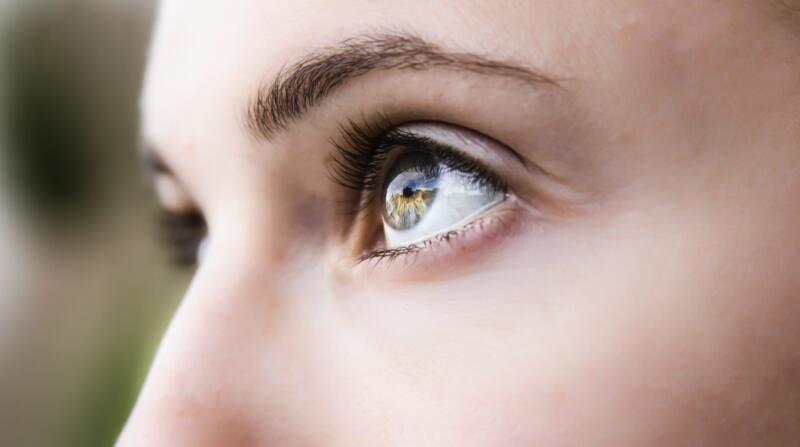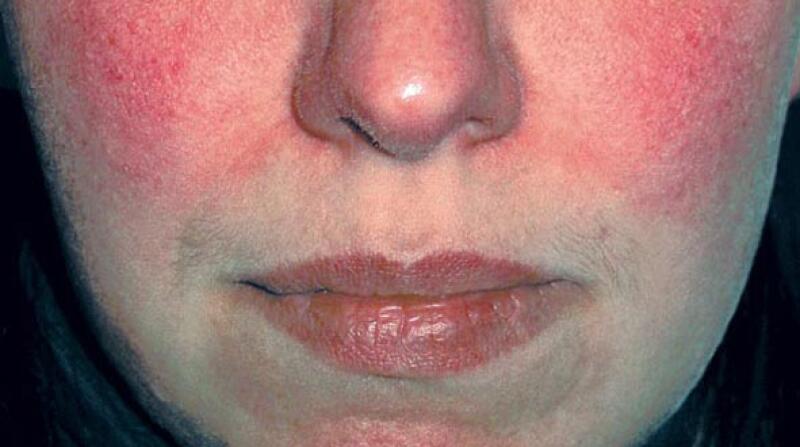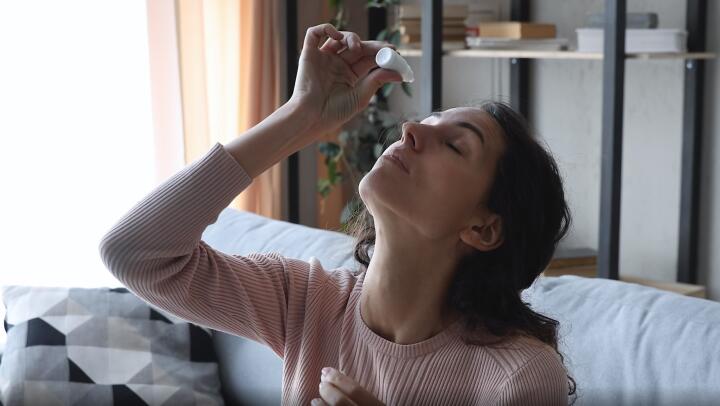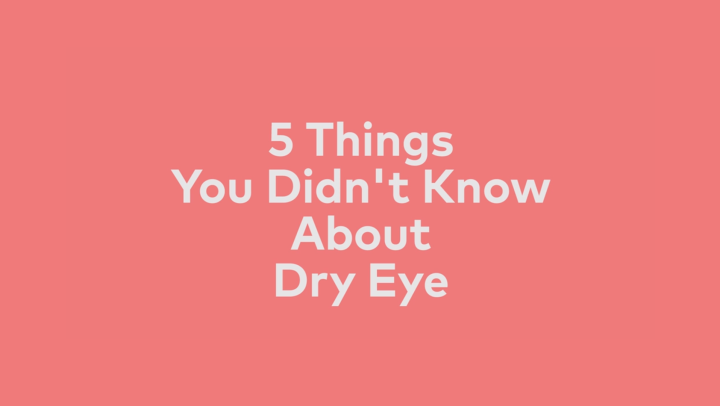8 Health Conditions That May Affect Your Eyes

Medically Reviewed By William C. Lloyd III, MD, FACS
Written By Sarah Lewis, PharmD on May 2, 2021
-
 Focus on These Causes of Eye SymptomsGetting regular eye exams isn't just important for the health of your vision. Many chronic conditions can also cause eye symptoms, such as dry eyes, damaged blood vessels--even blindness. If you're living with any of these 8 conditions, talk to your doctors about how your eyes may be affected and any steps you can take to reduce your risk.
Focus on These Causes of Eye SymptomsGetting regular eye exams isn't just important for the health of your vision. Many chronic conditions can also cause eye symptoms, such as dry eyes, damaged blood vessels--even blindness. If you're living with any of these 8 conditions, talk to your doctors about how your eyes may be affected and any steps you can take to reduce your risk. -
 1. DiabetesHigh and low blood sugar swings can cause temporary vision changes. But diabetes can cause more serious eye problems when it’s not controlled. High blood sugar levels over long periods of time damage the tiny blood vessels that supply your eyes. This can lead to diabetic retinopathy—a leading cause of blindness in American adults. People who have diabetes should also be aware they are at increased risk of developing cataracts and glaucoma.
1. DiabetesHigh and low blood sugar swings can cause temporary vision changes. But diabetes can cause more serious eye problems when it’s not controlled. High blood sugar levels over long periods of time damage the tiny blood vessels that supply your eyes. This can lead to diabetic retinopathy—a leading cause of blindness in American adults. People who have diabetes should also be aware they are at increased risk of developing cataracts and glaucoma. -
-
 2. High Blood PressureHigh blood pressure can also cause changes to the retina. This is called hypertensive retinopathy. Like diabetes, high blood pressure can damage the delicate blood vessels that supply the eye. In fact, your eye doctor may be able to diagnose high blood pressure during a regular eye exam. If you have high blood pressure, controlling it is vital to your vision. The longer your blood pressure remains high, the greater the risk of permanent vision problems.
2. High Blood PressureHigh blood pressure can also cause changes to the retina. This is called hypertensive retinopathy. Like diabetes, high blood pressure can damage the delicate blood vessels that supply the eye. In fact, your eye doctor may be able to diagnose high blood pressure during a regular eye exam. If you have high blood pressure, controlling it is vital to your vision. The longer your blood pressure remains high, the greater the risk of permanent vision problems.
-
 3. Autoimmune DiseasesThere are various autoimmune diseases that can cause eye problems. In fact, eye complaints are often the first symptoms many people with autoimmune diseases experience. These symptoms can be bothersome, such as dry, red or itchy eyes. But they can also be quite serious, such as sensitivity to light, eye pain, vision changes, and even loss of vision. Treating the autoimmune disease will help control the eye problems that come along with it.
3. Autoimmune DiseasesThere are various autoimmune diseases that can cause eye problems. In fact, eye complaints are often the first symptoms many people with autoimmune diseases experience. These symptoms can be bothersome, such as dry, red or itchy eyes. But they can also be quite serious, such as sensitivity to light, eye pain, vision changes, and even loss of vision. Treating the autoimmune disease will help control the eye problems that come along with it.
-
 4. RosaceaMore than half of people with rosacea have eye involvement—or ocular rosacea, according to the National Rosacea Society. The symptoms are redness, dryness, itching, burning, tearing, and having a gritty feeling in the eye. Some people also have swollen eyelids and sensitivity to light. The condition usually responds well to treatment when doctors catch it early. But it can lead to vision impairment and even vision loss if it becomes severe. Effective medical therapies are available. Consider seeing an ophthalmologist if you have ocular rosacea.
4. RosaceaMore than half of people with rosacea have eye involvement—or ocular rosacea, according to the National Rosacea Society. The symptoms are redness, dryness, itching, burning, tearing, and having a gritty feeling in the eye. Some people also have swollen eyelids and sensitivity to light. The condition usually responds well to treatment when doctors catch it early. But it can lead to vision impairment and even vision loss if it becomes severe. Effective medical therapies are available. Consider seeing an ophthalmologist if you have ocular rosacea.
-
 5. Infectious DiseasesEye infections like pinkeye are relatively common. But other types of infections can also affect the eye and eyesight. For example, shingles can involve the eye. With ocular shingles, the virus causes blisters, swelling and redness around the eye and eyelid. Shingles can also cause severe inflammation inside the eye. Eye pain is also common. If you have shingles on your face, see an ophthalmologist. Ocular shingles can permanently damage the eyes and vision. Measles and Lyme disease are two other examples of infections that can affect the eyes.
5. Infectious DiseasesEye infections like pinkeye are relatively common. But other types of infections can also affect the eye and eyesight. For example, shingles can involve the eye. With ocular shingles, the virus causes blisters, swelling and redness around the eye and eyelid. Shingles can also cause severe inflammation inside the eye. Eye pain is also common. If you have shingles on your face, see an ophthalmologist. Ocular shingles can permanently damage the eyes and vision. Measles and Lyme disease are two other examples of infections that can affect the eyes.
-
-
 6. Liver DiseaseWhen you think about liver disease and the eyes, jaundice probably comes to mind. The yellowing of the eyes and skin are a well-known indication that something is wrong with the liver. But there are other eye problems with liver disease. Dry, itchy eyes and xanthelasma—small collections of fat on the eyelids—can occur with cirrhosis. And congenital liver disorders can affect just about any part of the eye, including the cornea and lens.
6. Liver DiseaseWhen you think about liver disease and the eyes, jaundice probably comes to mind. The yellowing of the eyes and skin are a well-known indication that something is wrong with the liver. But there are other eye problems with liver disease. Dry, itchy eyes and xanthelasma—small collections of fat on the eyelids—can occur with cirrhosis. And congenital liver disorders can affect just about any part of the eye, including the cornea and lens.
-
 7. Nutritional DeficienciesVitamin A deficiency is a well-known cause of vision loss and blindness. It often starts as night blindness or trouble seeing in the dark. It can also cause severe dry eyes and lead to ulcers on the cornea. Other vitamins and nutrients also play an important role in eye health. Not getting enough vitamin C, vitamin E, lutein, omega-3 fatty acids, and zinc can increase your risk of developing cataracts and age-related macular degeneration. Ask your doctor about multivitamins to maintain eye health.
7. Nutritional DeficienciesVitamin A deficiency is a well-known cause of vision loss and blindness. It often starts as night blindness or trouble seeing in the dark. It can also cause severe dry eyes and lead to ulcers on the cornea. Other vitamins and nutrients also play an important role in eye health. Not getting enough vitamin C, vitamin E, lutein, omega-3 fatty acids, and zinc can increase your risk of developing cataracts and age-related macular degeneration. Ask your doctor about multivitamins to maintain eye health.
-
 8. Sickle Cell DiseaseVision loss, even blindness, is a complication of sickle cell disease (SCD). SCD is a group of red blood cell disorders that is passed from parent to child. The abnormal red blood cells can block blood vessels in the eye and cause damage to the retina. People with SCD should see an eye doctor every year to check the health of their retinas. Laser treatment may be an option if the doctor finds damage.
8. Sickle Cell DiseaseVision loss, even blindness, is a complication of sickle cell disease (SCD). SCD is a group of red blood cell disorders that is passed from parent to child. The abnormal red blood cells can block blood vessels in the eye and cause damage to the retina. People with SCD should see an eye doctor every year to check the health of their retinas. Laser treatment may be an option if the doctor finds damage.
8 Health Conditions That May Affect Your Eyes






















